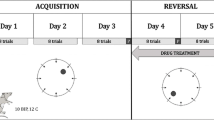Summary
The effects of the non-competitive NMDA antagonist dizocilpine in tests of cognitive function have been compared with its effects on motor function in rats. Severe motor impairments were observed at doses above 0.1 mg/kg. Dizocilpine (0.075 mg/kg) had no effect on the acquisition of a spatial discrimination task in a Y-maze, but disrupted reversal learning. Both the acquisition and reversal of a visual discrimination task were impaired following dizocilpine (0.075 mg/kg). Dizocilpine (0.04 mg/kg) also disrupted performance of a fivechoice visual reaction time task. It is clear that dizocilpine can impair cognitive function at doses which do not induce pronounced motor dysfunction. The impairment induced by dizocilpine includes a disruption of spatial discrimination learning and a deficit in tasks with sustained attentional demands.
Similar content being viewed by others
References
Bliss TVP, Collingridge GL (1993) A synaptic model of memory: long term potentiation in the hippocampus. Nature 361: 31–39
Carli M, Robins TW, Evenden JL, Everitt BJ (1983) Effect of lesions to ascending noradrenergic neurones on performance of a 5-choice serial reaction time task in rats: implications for theories of dorsal noradrenergic bundle functions based on selective attention and arousal. Behav Brain Res 9: 361–380
Clineschmidt BV, Martin GE, Bunting PR (1982) Anticonvulsant activity of (+)-5-methyl-10,11-dihydro-5-H-dibenzyl[a,d] cyclohepten-5,10-imine (MK-801), a substance with potent anticonvulsant, central sympathomimetic and apparent anxiolytic properties. Drug Dev Res 2: 123–134
Izquierdo I (1991) Role of NMDA receptors in memory. Trends Pharmacol Sci 12: 128–129
McEntee WJ, Crook TH (1993) Glutamate: its role in learning, memory, and the aging brain. Psychopharmacology 111: 391–401
Staubli U, Lynch GS (1991) NMDA receptors and memory: evidence from pharmacological and correlational studies. In: Kozikowski AP, Barrioneuvo G (eds) Neurobiology of the NMDA receptor from chemistry to the clinic. UCH Publisher Inc., USA, pp 129–148
Tricklebank MD, Singh L, Oles R, Preston C, Inversen SD (1989) The behavioural effect of MK-801: a comparison with antagonists acting non-competitively at the NMDA receptor. Eur J Pharmacol 167: 127–135
Author information
Authors and Affiliations
Rights and permissions
About this article
Cite this article
Cross, A.J., Murray, T.K. & Snape, M.F. Characterisation of learning and memory deficits following NMDA receptor antagonism. Amino Acids 8, 79–87 (1995). https://doi.org/10.1007/BF00806546
Received:
Accepted:
Issue Date:
DOI: https://doi.org/10.1007/BF00806546




